I was originally going to talk about the lost 1984 novelty Nothing Lasts Forever, a black-and-white space…comedy?…produced by Lorne Michaels, that I had finally watched on YouTube, until that not-so-surprisingly ended in disappointment (sometimes studios make the right calls, yes), but then by coincidence, one of this week’s enticing new DVD releases was Roman Coppola’s A Glimpse Inside the Mind of Charles Swan III. Connection? Mr. Bill Murray, co-star (not lead) in both. Needless to say given the creative forces here, his casting is mostly a matter of loyalty in each case, to the man who kickstarted his career on SNL and to the Coppola/Wes Anderson collective that enabled Phase II: The Sad Clown of said career. Bill Murray has amassed a legendary, if technically quite spotty, tenure as one of the funniest, most idiosyncratic actors of our times. Not only has he managed to remain one of the few stars whose work has always received a theatrical roll-out (something something clout mixed with good taste), but, in spite of his definitive, some might say limited laconic/deadpan persona, his selection of projects (not to mention his placement within them) has been more colorful and capricious than just about anyone on his fame level (except maybe Johnny Depp, but his list of credits is spiked with a higher rate of boring crap in-between the quirk). To wit: Murray has surveyed Hunter S. Thompson, a loony masochistic dental patient in a horror musical, a modern Ebeneezer Scrooge, a bank-robbing clown, a dangerous mob boss, drag queen actor Bunny Breckinridge, Bosley from Charlie’s Angels, a seedy lawyer in a winking soft-core mystery, a series of melancholy figures in and the most reliable collaborative partner among Wes Anderson’s loyal cadre (even Owen Wilson sat one out with last year’s Moonrise Kingdom), one of the 21st century’s definitive portraits of loneliness in Lost in Translation, a badger attorney in a stop-motion Roald Dahl adaptation, a version of Jacques Cousteau, Polonius, Garfield, FDR, and himself on three separate occasions (Space Jam, Zombieland, Coffee & Cigarettes). And that’s not even covering his signature, less outwardly flamboyant parts in fare like Ghostbusters, Stripes, Saturday Night Live, Meatballs, Tootsie, Groundhog Day, Caddyshack, What About Bob…
Well, broadcasting from the farthest margins are another couple oddities that most people will never know about: the one when Bill Murray is a villainous bus ride host in a sci-fi comedy so inscrutable that MGM never released it, and one that’s a surrealistic art-house Charlie Sheen biopic. You could hardly invent projects as random if you were the Aqua Teen Hunger Force showrunners. A highlights reel of Bill Murray’s film’s premises alone would be an amazing mindfuck. With a few indisputable exceptions (Larger Than Life, The Man Who Knew Too Little, Garfields), he has never walked the path of generic, assembly line cash-ins, hardly ever starring in studio-derived formula pics, thereby nurturing a unique reputation with more enduring respect than any other SNL golden child. Even the behavior that should count against him – rejecting numerous high-profile parts over the years (Hans Solo, the devil in Witches of Eastwick, Buzz Lightyear, Forrest Gump, Steve Carrell in Little Miss Sunshine), refusing the use of an agent, living “off the grid” making it a pain in the ass for anyone to contact him, and being tempermental on set – has instead enhanced his outlaw mystique. While he may not have re-defined the art of film performance per se, and not every one of his films is a classic, as a Hollywood icon who has (say it with me) played by his own rules, he is pretty unflappable, and in a class all his own.
Okay, so now that we’ve paid our respects at the altar of Bill Murray, are these extra-weirdo flicks any good? Short answer: not at all. However renegade his interests are, Murray is just as vulnerable to the skills of his chosen filmmakers as anyone (the aforementioned Tom Cruise and Leonardo DiCaprio notwithstanding, probably since they were savvy in harnessing the synergy of their fame to carefully assemble the finest collaborations each time they work, whereas Murray’s approach seems to be a more simple and direct “eh, this screenplay sounds like fun” or “yeah, okay, we’re friends, I’ll do you a favor and head on over to your set”). That is, his work is only as good as those he trusts to oversee it, and because he’s never demonstrated any fascistic Edward Norton/Mike Myers/etc. tendencies for taking control on the set, it’s often just luck of the draw on Bill Murray movies. We know he’ll turn up in something borne for the cult canon, but there’s no guarantee it won’t be a piece of crap. We’re just lucky that it usually isn’t.
In the case of Nothing Lasts Forever, writer/director Tom Schiller was the navigator, an acclaimed SNL short-film contributor who only once braved a big-screen auteurist voyage, only to have his ship condemned before even leaving the port. Without reading his memoirs about the experience, I can’t say for certain why he never made another movie (he went on to direct hundreds of TV commercials), but watching the 79-minute “forgotten masterpiece” on YouTube should be all the evidence you need. It’s a handful of disparate notions stiched into an itchy, inadequate fabric. 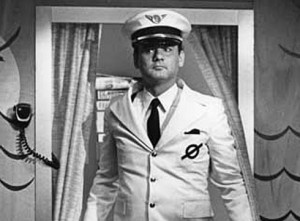 In theory I applaud the experimental combination of bizarre ingredients – for better or worse you’ll remember Jodorowsky’s latest film much longer than Jennifer Aniston’s, y’know? – and there is a whimsical dream logic to the framework of Nothing Lasts Forever – a totalitarian NY of the near future where an idealistic young man struggles to make an artist of himself, eventually travels to the moon. If this were a short film akin to those Schiller created on SNL, but produced for, say, The David Lynch Variety Hour! (if only..), then there wouldn’t be enough time to question its details or lose interest in the whole thing. It would be just enough for us to be charmed and fascinated. At even a modest 79 minutes, however, the movie wilts rapidly.
In theory I applaud the experimental combination of bizarre ingredients – for better or worse you’ll remember Jodorowsky’s latest film much longer than Jennifer Aniston’s, y’know? – and there is a whimsical dream logic to the framework of Nothing Lasts Forever – a totalitarian NY of the near future where an idealistic young man struggles to make an artist of himself, eventually travels to the moon. If this were a short film akin to those Schiller created on SNL, but produced for, say, The David Lynch Variety Hour! (if only..), then there wouldn’t be enough time to question its details or lose interest in the whole thing. It would be just enough for us to be charmed and fascinated. At even a modest 79 minutes, however, the movie wilts rapidly.
Even if the pacing weren’t so lethargic, the characters so underwritten, the acting so stiff, the dialogue so point blank primitive that someone may have translated the screenplay into another language and then had that version re-translated back into English for the shooting script, the art design beguilingly referential yet sloppily accumulated (it pays homage to classic ’30s cinema but could just as likely be a front for disguising a $42 budget with archival clips and crummy film stock), the third act nonexistent, the comedy all but forgotten except for the juvenilia of a guy checking out a naked lady through a peephole and Bill bonking his head, the misleading “musical” portion (oh yeah, it’s also officially categorized as a musical, FYI) furnished by nothing more than Eddie Fisher as himself crooning “Oh Mine Papa” (sweet Jesus..) and a brief trio of pleasant but limp, uninspired lunar numbers (a hula chant, a consumer jingle, and a love ballad), and Zach Galligan’s monstrous earlobes so distracting (it’s the black-and-white that accentuates their unreal enormity), there would still be the aggravating transition issues, not uncommon to misguided motion picture failures – in one instance, the Gods of Fate tell Adam (Galligan) he needs to go to the moon on a special assignment, but instead of sending him there themselves, in the next scene Adam is running away from them in confusion, and gets on a bus. Surprise, this isn’t a regular bus – it’s going to the moon! Only there’s never any suggestion that this was planned by the Gods for Adam. It was a complete coincidence, that aside from all the other strange, nonsensical rules of this universe, there’s also a hush-hush bus tour to the moon designed for elderly consumers, and Adam happens to board it by accident. Okay. Even worse is his grand adventure on the moon, which consists only of him meeting and falling in love with Lauren Tom (an enslaved hula girl) in a matter of minutes, and then Bill Murray finding them and a henchman punching out Adam. As a bewildering result, he basically falls back down to Earth, and is suddenly a famous pianist with Lauren Tom by his side, as a reward for having found true love on the moon as per the Gods’ request. How he escaped his K.O., who knows. Why, if the Gods have the power to control the outcome of Adam’s life, they even needed him for this task in the first place, who knows. Where Bill Murray is now, who knows. Was there a missing reel here that features the big lunar climax and provides a fluid resolution of all conflicts, or is this the most inert finale ever made?
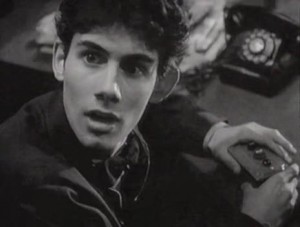
you thought I was joking about those ears?? For what it’s worth Zach Galligan, you probably did the best job of anyone in the movie
A Glimpse Inside the Mind of Charles Swan III sidesteps continuity issues and plotting itself by cheating. The title isn’t figurative – the movie actually is a series of fantasies and musings taking place inside Swan’s head. Initially chaotic with dream sequences, exaggerated interpretations of reality, and other silliness, the narrative gradually settles and reality trickles in as Swan comes to terms with his break-up. Yes, it’s the movie version of a break-up album. Though the parallels to Charlie Sheen’s self-destructive debauchery are obvious, this isn’t a consideration of his soul or his career. 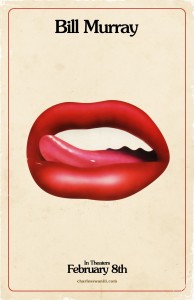 It’s Roman Coppola’s submission to the crowded field of break-up art, and once you swat away all the stylized misdirection, it’s hardly a fresh perspective. A self-centered, unfaithful asshole thinks the girl who left him is overreacting, little by little realizes she was right, he ruined it, but only when he hits rock bottom does he makes peace with her, shows signs of budding maturity and moves on. Generally, it’s a rock solid story arc to use, but as presented by Coppola, there is no wit, insight, or emotional honesty to the procedure. Just an extended recital of cliches, hoping to be shaken into a memorable cocktail by a cluttered, atonal decorative anarchy that further begs for attention by exploiting Charlie Sheen’s tabloid infamy. On Sheen’s own behalf, he performs competently as himself, but tellingly never takes off his pair of sunglasses throughout the whole thing except for about 4 seconds at the end when you think he’s finally gonna get real and challenge himself to actually act. But it’s not to be. Much like the false pretenses of the movie itself, Sheen only pretends to bare it all here, remaining all the while hidden well within his comfort zone.
It’s Roman Coppola’s submission to the crowded field of break-up art, and once you swat away all the stylized misdirection, it’s hardly a fresh perspective. A self-centered, unfaithful asshole thinks the girl who left him is overreacting, little by little realizes she was right, he ruined it, but only when he hits rock bottom does he makes peace with her, shows signs of budding maturity and moves on. Generally, it’s a rock solid story arc to use, but as presented by Coppola, there is no wit, insight, or emotional honesty to the procedure. Just an extended recital of cliches, hoping to be shaken into a memorable cocktail by a cluttered, atonal decorative anarchy that further begs for attention by exploiting Charlie Sheen’s tabloid infamy. On Sheen’s own behalf, he performs competently as himself, but tellingly never takes off his pair of sunglasses throughout the whole thing except for about 4 seconds at the end when you think he’s finally gonna get real and challenge himself to actually act. But it’s not to be. Much like the false pretenses of the movie itself, Sheen only pretends to bare it all here, remaining all the while hidden well within his comfort zone.
Those who wander into this film thinking it’s The Charlie Sheen Story will be disappointed – it doesn’t have the broad comic vulgarity of his Two and a Half Men stint nor does it plumb the scarier depths of the abusive scumbag enabled by his addiction. And even with Coppola in charge and all the indications of wacky, studied melancholia, this isn’t Wes Anderson’s ode to a misunderstood celebrity (which, by the way, should become a sub-genre with its own banner, after P.T. Andreson did it for Adam Sandler, Judd Apatow..also…did it for Adam Sandler, and this movie pretending to do it for Sheen. When will Quentin Tarantino mold his 3-hour grindhouse comedy to the biography of Lindsay Lohan?). Coppola hasn’t the focus to present a complete or unique vision, nor the acumen to affectingly make his points. The plot wanders through indulgent metaphors that never take off, gimmicks for their own sakes (a whole scene with Sheen and his maid spoken in Spanish, a kitschy stage duet with his ex at the end), and ends in a heavy dose of meta (cute: the cast introducing themselves in the credits; unjustifiably going too far: the long final shot ending on a reflected surface showing Roman Coppola filming himself). And I’m not proud to take the low road to sum up my review here, but let’s not look a gift horse in the mouth: regarding a conversation about Charlie’s girlfriend, sister Patricia Arquette loses her patience and exclaims, “you know what? This whole thing is boring!” Freudian slippery at its finest.
Neither film is worth your time, really, unless you’re either a hardcore cult-film seeker or a Bill Murray completist, in which case prepare for some amusing cognitive dissonance – he plays it straight both times (more so in Nothing). No ironic line readings, no funny-guy-affecting-a-poker-face. Because each film is a pseudo-comedy, he does say and do some things that are meant to elicit laughs, but he’s not the quintessential Bill Murray who transcends artifice. In Nothing Lasts Forever, he’s legitimately a tool (as the character, not as an actor): pesky, suspicious, bullying, two-faced and smarmy (the one giveaway Murrayism), and the closest thing to the film’s antagonist. For Charles Swan, because it was made in the latter days of Murray’s saga, he’s his vintage depressed elderly self, with a few nods to the Peter Venkman schtick, but surprisingly laid bare in a number of scenes, taking the goofy material seriously and even opening up about marital troubles. It’s jarring, not altogether fruitful considering the incoherent screenplay, yet kind of enthralling anyway. Here’s a guy whose every facial expression and line reading on screen invariably comes with proverbial air quotes. Even when he’s not being a sarcastic commentator and instead reveling in existential mystery (Lost in Translation, Broken Flowers, all Wes Anderson), he composes himself in such an arch-self-aware manner that you find yourself simultaneously admiring the subtlety of his sorrow and laughing at the implied wink of every syllable and glance. There were several moments in Jarmusch’s characteristically minimalist Broken Flowers where the camera merely holds steady on Bill Murray as he silently observes something going on in front of him, and without pratfalls, double-takes, other hammy tricks, and hardly any twitch of his face at all, Murray makes these scenes completely hilarious. When you think about it, he had a big hand in pioneering our archetype of hipster detachment – making it funny and cool to respond with withering indifference to everything, or, alternately, pretending to make a big deal out of something when he could clearly hardly care less (best example: his histrionics in Scrooged, like a post-modern thesis on the artificiality of performance). I don’t think he actively intends to perform this way like it’s a stage act; it’s just the way he is, his own sense of humor and innate personality, and I love that we’ve had a movie star like that for the past four decades.
So, but these two parts: sincerity from the sultan of sarcasm? Earnestness from the earl of irony? Sorry, that was some tortured wordplay. These are disturbing tangents in the Bill Murray canon. And two opposing flavors of straight-man, no less – Nothing Lasts Forever is him acting with the naive compliance of a rookie (even though he was already moderately famous by 1984), while Charles Swan is often him with the naked honesty of a veteran (not as enticing as it sounds). That both movies are so crippled with shortcomings is unfortunate but judicious – no one should fly this close to the sun of normalizing Bill Murray. Or rather, when the movie he’s working on is so bad, maybe it disables his freak tendencies and he’s just stunned into uniformity. Yeah, that’s probably it. So unless a miracle exception occurs, then use this as a rule of thumb going forward: if you see Bill Murray giving a candid performance, utterly beholden to the words on the page, stay the fuck away from whatever it is, because it probably sucks. You’ll want to stick around to see what that’s like, but you’ll end up with these turkeys, or, arguably, The Razor’s Edge (not utter wreckage like these, but then, he’s not very convincing as a dramatic thespian in that one either). There’s nothing wrong with him or anyone adhering to a script, but history has shown, at both ends of the spectrum, that it doesn’t do Bill or the film any favors. If you want Bill Murray in your movie, let him be Bill Murray – that’s never not good enough. But if you’re just gonna neuter him and use his participation to sell the movie, then better yet find some other celebrity with less distinction and natural charisma to exploit whose zombification won’t affect the guy’s street cred (Roman Coppola, if you keep operating on this level of filmmaking for your own pictures: stop borrowing Wes’s toys and give Chevy Chase a call. You deserve each other. Who knows, maybe you’ll unearth the hidden talent in his douche-ry. Lorne Michaels from the ’80s: should’ve called Chevy). Also, try making good movies, not just “weird” ones with a million gimmicky crutches and not a single entertaining or meaningful moment.
NOTHING LASTS FOREVER: D
A GLIMPSE INSIDE THE MIND OF CHARLES SWAN III: D
BILL MURRAY: A

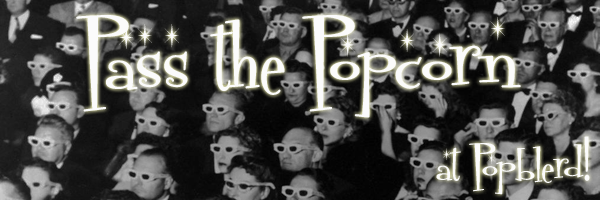
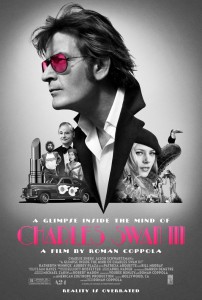
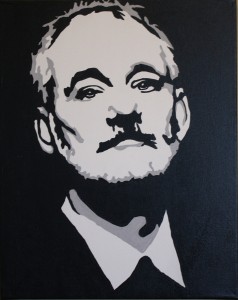
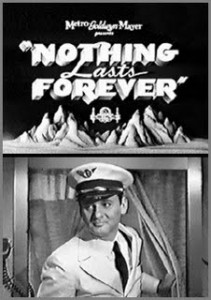
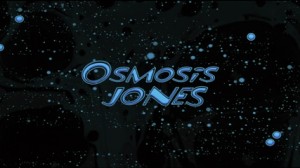
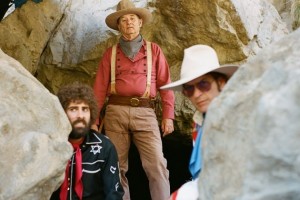
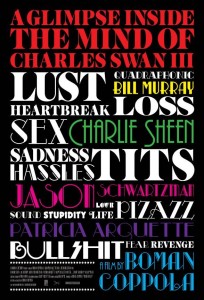
1 comment
Garret says:
Aug 27, 2014
Nearly everything you dislike about Nothing Lasts Forever is what I liked about it. The internet buzz regarding Bill Murray’s role (not exactly a central character) did somewhat overstate Schiller’s film as a “lost masterpiece” –which does invites huge expectations. It’s unfortunate because it indeed doesn’t fit that kind of towering mold at all. In your review, it read like you had a mission to make that point clear, but in a carpet bombing way.
I’ve watched NLF several times (not once distracted by Galligan’s earlobes, thank you) and I find it’s a very good film. I can understand putting daggers into a review when a movie proclaims masterful artfulness. Again, it was the regurgitation of social media articles that did that. In contrast, I take Mr. Schiller’s work here as consciously playing against that type, not with an heavy-handed agenda but expressing a freedom to operate by its own rules. Of course, it’s idiosyncratic and I’m more than fine with that, because in spite of its flaws, it still gives something in return for it’s departures from convention.
Nothing Lasts Forever is sort of akin to a Dr. Seuss work. That kind of “dream reality” and absurdity is one of the best reason to commit it to the film medium. Schiller does so very smartly and it’s a rare instance of a somewhat sweet movie made for a smart audience, as well.
I don’t knock this film for it being held back from distribution. It was amazing that MGM backed it as far as they did and I celebrate that! In retrospect, it has an air of usurping convention in a child genius kind of way, not quite subversive but close.
I can see that if this sort of movie is not going to be one’s cup of tea, it might give someone a headache. But it seems to me that you’d have to have a very taut constitution not to roll with it, at least a little, because it’s such a welcome relief from the standard Hollywood product. For example: the “consumer moon adventure”, replete with ersatz “It’s a Small World” amusement park music, is sharp social satire, as are the trappings of the Soho espresso shop with all the manifestations of art zombies trying to park their aesthetics in the recesses of the soulless underground. I give this film very high marks for those brilliant segments alone.
Too bad the clips have been removed from YouTube. So is all this moot or will WB’s going to release it? Who knows? I love this film.